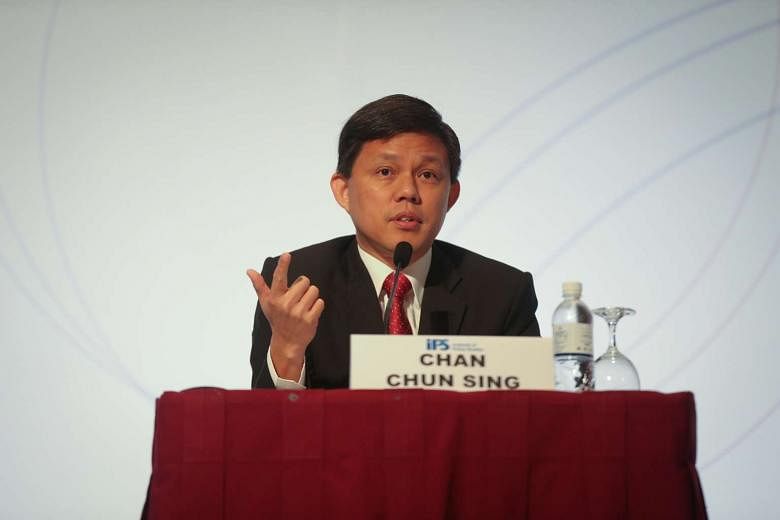What keeps Singapore leaders awake at night is not whether the People's Action Party (PAP) rules forever but whether Singapore will last forever, Minister in the Prime Minister's Office Chan Chun Sing said yesterday.
And at the heart of ensuring the country thrives and survives is good governance, he said.
This, in turn, requires Singapore's leaders to know when to change policies, and themselves, to keep up with the times.
Mr Chan, who is also the labour chief, made the point at a think-tank discussion on how to maintain good governance in an increasingly diverse society.
Panel moderator Warren Fernandez, The Straits Times editor, had asked Mr Chan to define good politics in the light of President Tony Tan Keng Yam's address last Friday. President Tan had said the Government will study ways to improve the political system.
Mr Chan, in his reply, said good governance is crucial if Singapore is to defy the odds of history as small states tend to be short-lived.
"Our concern is not whether the People's Action Party will rule forever. Our larger concern is whether Singapore will last forever.
"Political parties are there to lead, but political parties must evolve in order to make sure the higher goal of sustaining the country is achieved," he said.
This focus on improving Singapore lies at the core of the Government's approach to accommodating the growing diversity of voices in politics here, he said.
The discussion was among four held yesterday at the Institute of Policy Studies' annual Singapore Perspectives conference, which examines the public policy challenges facing the country. About 900 academics, public servants and students attended the conference.
During the discussion, panellist and political commentator Eugene Tan asked Mr Chan for his views on the political system, which Associate Professor Tan saw as one in which all eggs are put in one basket.
Prof Tan noted that key sectors like the trade unions are "very intimately tied to the ruling party".
He asked: "In the event that the ruling party becomes incompetent or corrupt, something which even the founding Prime Minister Lee Kuan Yew didn't exclude, how do we then prevent Singapore from going through a systemic collapse?"
Mr Chan replied that this was a concern of the PAP as well: "Institutionally, how do we bring in people with diverse perspectives?"
This was why the Government started the Nominated Member of Parliament and Non-Constituency Member of Parliament schemes, although it did not need to, he said.
Both schemes guarantee a minimum number of non-PAP representatives in Parliament, even if the PAP should win all 89 elected seats.
Picking up on the theme of political diversity in the context of a dominant party, Ambassador-at-Large Tommy Koh asked Mr Chan if the PAP was a victim of its own success.
He likened the PAP to a banyan tree that can stifle the growth of smaller entities beneath its large canopy. "Is the party aware of the need to trim the banyan tree further in the new Singapore? Would it give more room to civil society and reduce the role it plays?" asked Prof Koh, a point that panellist and Drama Box artistic director Kok Heng Leun also picked up on.
Mr Chan said the Government must know the plethora of options available, pick the most appropriate at the time, and be ready to jettison outdated ideas.
Good governance, he said, includes meeting aspirations for more plurality in politics.
Good governance should also involve people acting together to achieve shared goals, he said in response to panellist and Lianhe Wanbao editor Lee Huay Leng, who asked how the Government is taking a more collaborative approach.
Medical professor and opposition electoral candidate Paul Tambyah asked whether good governance should be for the benefit of foreign investors or Singaporeans.
At the heart of it, Mr Chan replied, Singapore's politics should be driven by the desire to improve the lives of its people: "The purpose of governance is, first, to improve the lives and livelihoods of our people and, second, to be good stewards to leave behind a better Singapore for the next generation."
SEE OPINION A21: The 'We' in our National Pledge


